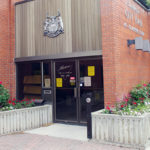Home »

Happiness is not simple: Senator Sinclair
By Anne Jardine
The East Kootenay Humanity Network invited Senator Murray Sinclair to speak at Cranbrook’s Key City Theatre on May 14 to commemorate the International Day of Happiness.
The question of the day was: What does happiness mean to you?
For seven years, from 2008 until 2015, Senator Sinclair chaired Canada’s Truth and Reconciliation Commission on Indian Residential Schools. When the report was released in 2016, he toured Canada presenting the Commission’s findings with its 94 calls to action.
At Key City Theatre, Senator Sinclair began his talk with an observation: “Truth is hard. Reconciliation is harder. Happiness is elusive.”
Senator Sinclair, who grew up in a poor family on a Manitoba reserve, struggled to stay in school, struggled to go on to university, and then to law school. He was the first Indigenous person from Manitoba to be appointed as a judge. He was reluctant at first to accept the nomination because he thought judges were boring and not very nice, and he enjoyed being a lawyer – advocating, and representing people who needed a voice.
He was persuaded by Justice Alfred Scow, B.C.’s first Aboriginal judge to accept the judicial appointment the third time it was offered. Judge Scow recounted his difficult journey in the justice system, told of the challenges and the rewards of his life as a judge, and fully examined both sides of the job.
His deciding argument was that justice is better served by having voices on the bench as well as at the bar. When Sinclair accepted his appointment to the bench, he was determined to be not only fair, but absolutely respectful to all who came before him, no matter how bad their crime might be. As a lawyer, he had witnessed cruel treatment towards offenders. As a judge, he wanted his decisions to be tempered by kindness.
Launching into the happiness question, Senator Sinclair said he was happy that progress is being made on Canada’s human rights issues, but unhappy because justice is moving so slowly.
“Happiness is not something to be achieved, but rather to be pursued. It is not a right. In the US Constitution, one of the great precedent documents on human rights, happiness is not guaranteed. The Constitution guarantees only life, liberty, and the pursuit of happiness.”
Senator Sinclair reviewed the troubled history of Canada’s relationship with its First Peoples, from the Royal Proclamation of 1763 to the BNA Act of 1870. In the treaty process that followed Confederation, schools clauses were negotiated. Land was surrendered, not life.
In schools, Indigenous people thought their children would be educated to take part in a society that would open up new opportunities for them, but residential schools turned out to be indoctrination centres where they learned that their families were pagans and savages, their languages were primitive, their traditional ways of hunting, gathering, and moving freely about on the landscape were no longer acceptable. They were taught that their people were dirty, drunk, lazy, and sinful. They were separated from their families; brothers and sisters and cousins were not allowed to speak to each other within the schools, and often children were not allowed to go home on holidays if their own families could not afford to come and take them home.
Food was scanty. Children were always hungry. Fifty percent of the children attending residential schools experienced physical or sexual abuse. The remaining fifty percent lived in fear. The system was set up in 1867 and the last residential school closed in 1996. Over those 130 years, there were thousands of deaths and millions in lawsuits that will never bring back the lives that were lost or devastated. One outcome is a $5 billion settlement package. The other outcomes are thousands of lives affected by addictions and violence, and thousands of missing and murdered indigenous girls and women.
At this point, Senator Sinclair played a short, powerful video, “A Perfect Crime” produced by his friend Aaron Peters.
“Happiness is not simple,” said Senator Sinclair. “I feel it, of course in the pride I feel in my children, my family. But I worry about my daughters and grandchildren going out at night on the streets with their friends — their safety.
“I realize that happiness is not something I can take for granted,” he continued. “We are in a transitional period right now, from oppression to freedom. Oppression is the anchor we drag around. Reconciliation is the challenge that will lead us to freedom.”
A member of the audience asked, “How can we help? What does reconciliation look like for you?”
“We have spent over seven years learning about and documenting the truth, the experiences that have resulted from the indoctrination institutions that we know as residential schools. Now that we know about it, what are you going to do about it? Reconciliation looks like this: I will be a friend to you. And I hope you will be a friend to me. You need to teach your children how to speak with us respectfully. You need to protect your children and grandchildren from becoming racists. Don’t stand by and witness injustice without speaking up. You cannot do everything, but you can do what you can where you are with who you know.
“Renowned social psychologist Franz Fanon identified the four stages of oppression: 1) Give in to it. 2) Hurt yourself. 3) Oppress others. 4) Rise up and strike back against the oppressor. We don’t want to perpetuate any of these. We have to stop this cycle. That is the great challenge of reconciliation. It is also a great opportunity.
“Happiness remains elusive. It is not a state that you achieve and never leave. I still cry.”
After his presentation, Senator Sinclair spent a further hour visiting and answering questions and posing for selfies with many members of the audience.
The following day he would be speaking with groups of students from Cranbrook and area schools.
Please contact Amy Cross 250-581-2111 or [email protected] for more information about the Humanity Network.
Lead image: Senator Murray Sinclair speaks with Gerri Atchison. Gerri is with Cranbrook and District Restorative Justice Society. CDRJS provides administrative support for the East Kootenay Humanity Network. (Photo by Debbie McPhee)
e-KNOW







